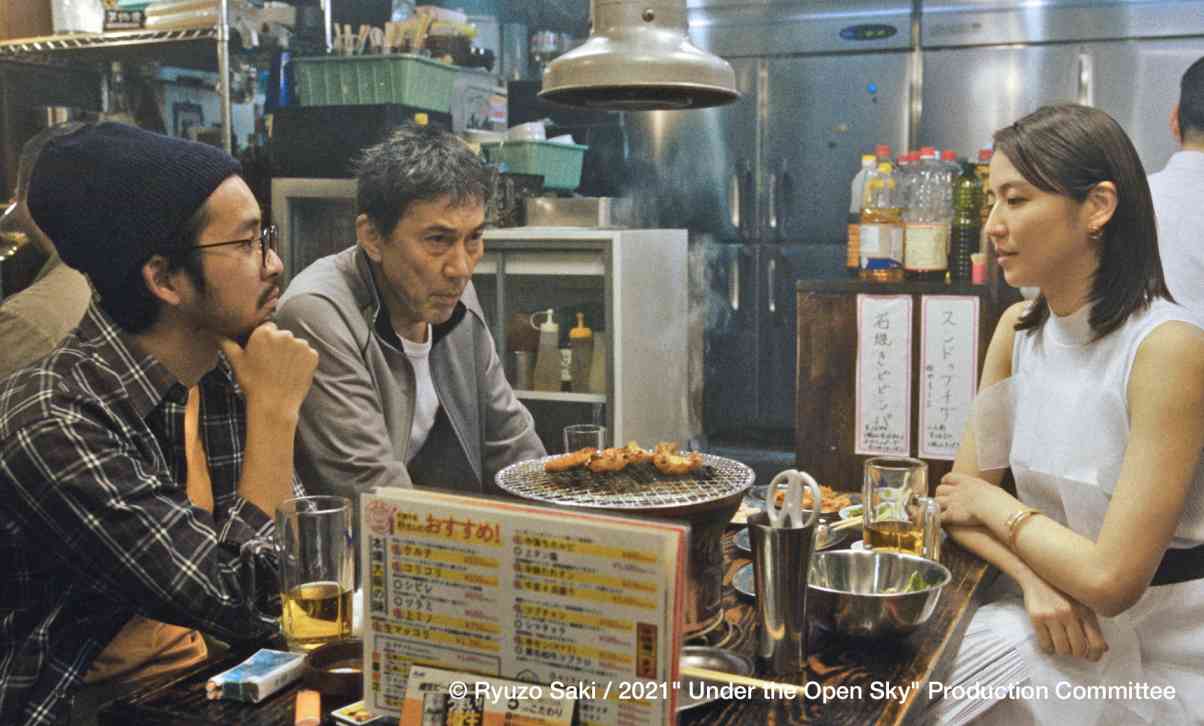ACN Film Review: Under the Open Sky, a poignant depiction of Ex-con’s struggle to return to Japanese society
A murder convict Yakuza (gangster), released after 13-year imprisonment, journeys to find the mother who abandoned him as a child. He is hindered by his criminal past and struggles to adapt to his new life in the contemporary but rigid society in Japan.
Japanese Film Festival Online 2022 by Japan Foundation, New Delhi
REVIEW by Sunil Kumar: Under the Open Sky (すばらしき世界)
NEW DELHI/INDIA: This two-hour long Japanese film is a poignant depiction of the ordeal of a middle-aged murder convict and gangster, originally known as Yakuza in Japan, and his struggles of re-entering the contemporary Japanese society after the completion of his 13-year sentence, and spending rest of his life as a reformed person.
The film is based on a novel ‘Mibuncho’ written by Korea-born Ryûzô Saki (1937). He was a writer and actor, known for some of the excellent works like The Miracle of Umitsubame Joe, and South to the Horizon. He died at the age of 78 in Fukuoka, Japan in 2015.
Incidentally, this Japanese film also finds some commonality with an Indian super hit Hindi film “Dushman”, (Enemy) released in 1971 starring Bollywood superstar Rajesh Khanna who played the lead role of a murder convict, and he is seen struggling hard to get accepted in the society. This film was also made in Tamil as Needhi in 1972, in Telugu as Khaidii Babay (1974), in Malayalam as Maattoly in Kannada by Shankar Nag as Hosa Theerpu (1983), and in Bengali as Nishpap Asami (1997).
 However, the Japanese award-winning film Under the Open Sky also brings to the fore the lesser-known fact about and the darker side of the world’s number 3 economic superpower Japan – the underworld Yakuza, which represents transnational organized crime syndicates originating in Japan.
However, the Japanese award-winning film Under the Open Sky also brings to the fore the lesser-known fact about and the darker side of the world’s number 3 economic superpower Japan – the underworld Yakuza, which represents transnational organized crime syndicates originating in Japan.
The film is based on the real-life story of a Yakuza whom the author of the story met and minutely studied his experience of his stay in the prison as well as the ordeal when he made untiring attempts to return to the civil society after his release from the prison after 13-years of the sentence.
In Snapshot: Under the Open Sky (すばらしき世界)
GENRE: Drama (Crime & social reformation)
CAST: YAKUSHO Koji, NAKANO Taiga, ROKKAKU Seiji, NAGASAWA Masami
DIRECTOR: NISHIKAWA Miwa
WRITERS: NISHIKAWA Miwa, RYUZO Saki (Novel Mibunchо)
SCREENPLAY: NISHIKAWA Miwa
RELEASED: Year 2021 in Japan
RUNNING TIME: 02hr 06min (126 minutes)
SCREENING (Online) @: Japanese Film Festival Online 2022 (Feb 14-27)
ORGANISOR: The Japan Foundation, New Delhi
AUDIENCE WARNING: Contains violence and drug use
DIALOGUES: Japanese
SUBTITLES: English
According to the film director NISHIKAWA Miwa, the main character of the film was modeled after the real Yakuza the author of the novel had met.
“Japan continues to be a difficult place for any formal convicted criminal hoping to return to society and lead a normal life. For those of us on the returning side of receiving such a return, it’s probable that none of us have given the issue much thought in our lives. Although there are no big events in the story, the challenges faced by the ex-cons returning to the society and the walls they hit, and the dis-communication they experience with receiving society have been painstakingly depicted here,” she said in her address to the audience.
Film Festivals & Awards:
–2020 Chicago International Film Festival – Winner of the Silver Hugo Award for Best Performance by Koji Yakusho
–2020 Chicago International Film Festival – Winner of the Best International Feature Film’s Audience Choice Award
NISHIKAWA Miwa said, “I made this movie with the hope that the people will realize how close to home the story hits. The lead character is played by YAKUSHO Koji who is a globally acclaimed actor representing Japanese cinema. I think it was a very challenging role for him to inhabit…. Playing a man who after his life in the Yakuza underworld repeatedly struggled to acclimate himself to general civil society but Yakusho’s performance as Mikami was remarkable receiving well-deserved acclaim at global film festivals including the Best Performance award at the Chicago International Film Festival
The film begins in Asahikawa Prison, where a middle-aged man named Masao Mikami (YAKUSHO Koji) is being released into the wintry landscape of Hokkaido. Mikami, a former yakuza, has just completed a 13-year sentence for murder and has resolved to leave his criminal past behind, and lead a normal life again.
His lawyer and social worker encourage him, telling him that making connections with other people is essential for re-entry into society. That is, of course, easier said than done. He has no friends or family to lean on, no marketable skills, and no valid credentials to help him find meaningful work. Yet, Mikami soldiers on determined to live with dignity.
 The story is told with genuine sensitivity, and the film director Nishikawa avoids the naïve suggestion that everything about his Yakuza past was bad. It’s part of his life journey, and the way he set about his work, following simple instructions with efficiency and vigor, are the way he can redeem himself and forge a new path, only this time with different choices.
The story is told with genuine sensitivity, and the film director Nishikawa avoids the naïve suggestion that everything about his Yakuza past was bad. It’s part of his life journey, and the way he set about his work, following simple instructions with efficiency and vigor, are the way he can redeem himself and forge a new path, only this time with different choices.
“Society today is extremely cruel to people who step off the path. One mistake and you’re essentially condemned, but even those of us who stay on the path isn’t happy. So we’re unforgiving. We all feel the same way you do, but we keep our mouths shut in fear of being ostracized.”
It is a powerful and moving inspection of one man’s quiet struggles with contemporary Japan’s crushing social expectations. It’s a shame that the film hasn’t received wider international distribution.
Under the Open Sky’s meditations on alienation and criminal justice have universal resonance and represent a promising new direction for yakuza films and Japanese cinema in general. We see the complex portrait of a person’s – hopes and dreams, frustrations and insults – trying to find his way in a world that’s constantly trying to throw him off balance. Then there’s the simplest theme and idea that’s spoken in a universal tongue: can we catch up with life and belong once again when we’ve been left behind? The need to belong and have a purpose connects every person, from every walk of life. It’s a struggle that you don’t need to be Japanese to identify with.
About the Director:
 NISHIKAWA Miwa was first discovered by film director Hirokazu Kore-eda (“Shoplifters”), working with him from “AFTER LIFE (1999).” After working with many veteran directors, she made her directorial debut with “WILD BERRIES” (2003). Her second film, “SWAY” (2006), was acclaimed at Cannes’ Director’s Fortnight, and her third film, “DEAR DOCTOR” (2009), also enjoyed great success at the box-office in Japan, winning various awards, including Best Screenplay Award at the 2010 Annual Japan Academy Prize. Her fourth film, “DREAMS FOR SALE” (2012), had its world premiere at Toronto International Film Festival. Her novel “THE LONG EXCUSE,” nominated for the Naoki Literature Prize (2015) for the second time, was adapted into a movie with Nishikawa as director (2016). She has been writing original stories for her feature films which also earned her literary prizes. The latest film “Under the Open Sky” is her first feature based on the novel “Mibuncho” written by SAKI Ryuzo.
NISHIKAWA Miwa was first discovered by film director Hirokazu Kore-eda (“Shoplifters”), working with him from “AFTER LIFE (1999).” After working with many veteran directors, she made her directorial debut with “WILD BERRIES” (2003). Her second film, “SWAY” (2006), was acclaimed at Cannes’ Director’s Fortnight, and her third film, “DEAR DOCTOR” (2009), also enjoyed great success at the box-office in Japan, winning various awards, including Best Screenplay Award at the 2010 Annual Japan Academy Prize. Her fourth film, “DREAMS FOR SALE” (2012), had its world premiere at Toronto International Film Festival. Her novel “THE LONG EXCUSE,” nominated for the Naoki Literature Prize (2015) for the second time, was adapted into a movie with Nishikawa as director (2016). She has been writing original stories for her feature films which also earned her literary prizes. The latest film “Under the Open Sky” is her first feature based on the novel “Mibuncho” written by SAKI Ryuzo.
Related article: Starting Feb 14, Japan Film Festival to virtually showcase 20 movies globally including India



